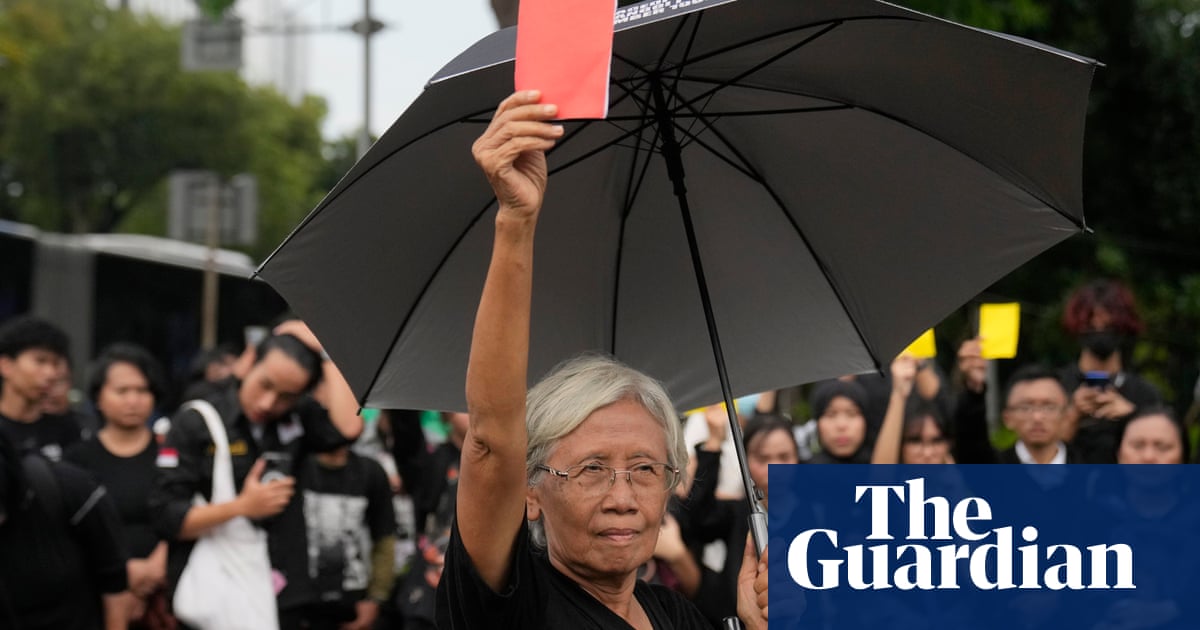Every Thursday for the past 17 years, in searing heat and pouring rain, Maria Catarina Sumarsih has stood outside the Indonesian presidential palace, demanding justice for her son. He was shot dead in 1998, when authorities opened fire on student protesters as they called for an end to the rule of dictator Suharto.
Soon, it is assumed, the palace behind her will be inhabited by Prabowo Subianto â a former son-in-law of Suharto and a special commander under his 32-year regime, one of the most brutal and corrupt of the 20th century. He is accused of involvement in a series of rights abuses, including enforced disappearances and torture during the Suharto era, which ended in the same year that Sumarsihâs son died.
At this weekâs vigil, held the day after Prabowo declared victory in Indonesiaâs presidential election, Sumarsih vowed to continue her fight for accountability not only for her son, Wawan, but for all of the victims killed under Suharto.
âWhen Wawan was shot, my grief transformed into love for others,â she said. âWhat I am fighting for is not only the shooting of Wawan and his friends, but all cases of serious human rights violations.â
Sumarsih said she was worried that the prospect of accountability for past abuses would fade further under a Prabowo-led government, and that the countryâs democracy could weaken. âThe possibility of Indonesia returning to an authoritarian, militaristic and corrupt country is very open, very wide open,â she said.
Sumarsihâs son, Bernardinus Realino Norma Irmawan, known as Wawan, was 20 years old when he was shot dead in 1998. He was a student at Atma Jaya Catholic University, Jakarta, majoring in accounting economics, and had become involved in student rallies that gripped the city. âHe was an honest child and he was a fighter for reform and democracy,â Sumarsih said.
Wawan was part of a volunteer group that helped injured protesters. On 13 November 1998, students had gathered at their campus. Someone opened fire, she was told, and Wawanâs friend was shot. Wawan asked permission to help him. As he tried to do so, a bullet struck him in the chest.
That day, she had cooked his favourite food â tamarind vegetable soup and empal. It was left untouched. Wawan was buried the next day.
Seventeen people were killed on 13 November 1998. Nine police personnel were sentenced over the killings, but human rights groups say that, as in similar cases, senior figures have not been held to account.
Muhammad Isnur, head of the Legal Aid Institute Foundation of Indonesia (YLBHI), pointed to National Commission on Human Rights findings that there may have been serious human rights violations that day. âThis is not an ordinary incident,â Isnur said.
There is no suggestion that Prabowo was implicated in the shooting of Wawan, but he has been accused of involvement in other acts of violence, including enforced disappearances and torture of student activists.
Of more than 20 activists kidnapped, 13 are still missing. Prabowo admitted in a 2014 interview with Al Jazeera that he was involved in kidnappings, but said he was under orders and that his actions were legal. He was discharged from the military over the allegations and banned from entering the US for two decades. He is also accused of involvement in rights abuses in Papua and Timor-Leste, which he has denied.
If Prabowo truly wanted to rule for the good of the nation, âhe must surrender to law enforcement and say: âI am the person responsible,ââ said Sumarsih, referring not to her sonâs case but to other incidents in which Prabowo is accused of involvement in abuses.
Over recent years, Prabowo has softened his image, presenting himself as a harmless grandpa figure. His campaign posters featured a cuddly cartoon version of him, and at rallies he has danced playfully on stage, with clips going viral on social media and winning over younger voters.
Joko Widodo, the outgoing president, known as Jokowi, has acknowledged that serious human rights violations occurred in the past, including the incident in which Wawan was shot. But Sumarsih, who previously supported Jokowi, said he had failed to provide justice and had instead prioritised personal interests. Jokowiâs son ran on a joint ticket with Prabowo, and the presidentâs tacit support provided a huge boost to his campaign.
âThis is not only a betrayal of justice, but also tramples on the struggle of the Indonesian people who are fighting for democracy and reform,â Sumarsihâs group Victim Solidarity Network for Justice said in a statement on Thursday.
The group urged Jokowi to order the attorney general to review investigation files collated by the human rights commission and form an ad hoc human rights court to address cases of enforced disappearances in 1997-98. It also called for victims and their families to have access to justice, reparation and guarantees that such events would not be repeated.
Sumarsih, who stood in the pouring rain on Thursday afternoon outside the palace, said her weekly vigils would continue. Similar actions had spread to 65 cities across Indonesia, she said, and young people had also become involved. âWhen I am old, or even when Iâm dead, I believe they will continue the fight to create an Indonesia with a just, wealthy and prosperous society,â she said.
